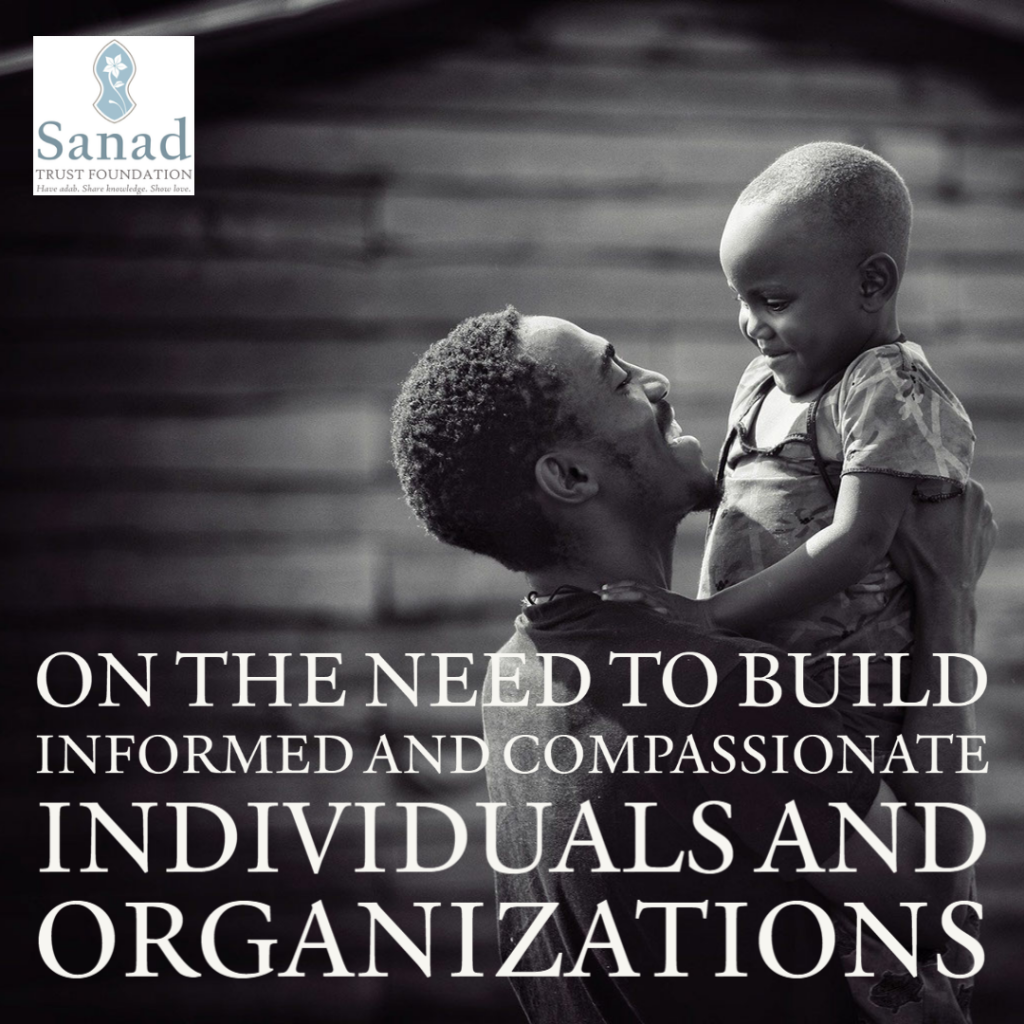The need to build informed and compassionate individuals and organizations
Recently I spoke to Sanad Prep students about loss of life that so often occurs due to oppression, and the lack of accountability and justice that so often follows. The following is an edited summary of this talk.

Whenever there is a loss of life due to any form of oppression and justice is not served, then people of conscience and dignity are rightfully pained. When this happens systemically, spanning generations and geography, there must come a moment for every member of humanity living in that time as a witness to look deep in their soul and heart and determine where each stands in relation to the oppression they see. When we all do this, we may give ourselves a chance to connect, to understand, to empathize. And God always knows best.
There are communities and individuals that haven’t met even though they’ve been next to each other for a very long time. As a result, there are many people today that are in pain and there are many others that don’t really understand that. Many of us have never learned to appreciate the state of emotional pain in an ‘other’. And that’s a big problem, that’s a big divide. Once you have that breakdown you can’t do the things that need to be done to uplift one another. You can’t appreciate another person essentially and you’re going to have a hard time valuing them. You’re also going to have a hard time building something together with that person.
As Muslims we have a great example in our Prophet (peace be upon him). He was able to see everyone in his community, he was able to empathize with them, he was able to understand their pains and their hardships. He was able to help them help themselves and also help them directly.
The need to get out of our psycho-social digital boxes
To our older students, I really wanted to make the point that we really need to get out of our psycho-social digital boxes and expand our cognition, compassion, and awareness. We must really start to see more of one another and strive to understand. We must inquire and be informed about other people and other situations, and begin to value those things. We can then begin to build something good within ourselves and with others.
All of this is so that we leave this world in a better way than we receive it. That we improve it while we’re here. I believe that this is an important conversation for us to have within our own selves, but also with one another and especially our youth. There is tangible benefit in this effort if done with ikhlas (sincerity). We must not be negligent of our responsibilities towards a people, or a cause, or situation in which there are individuals who are hurting and who are in pain. And we can not pass this air of negligence down to the next generations either.
We must feel as much as we can. Whether it’s a refugee crisis overseas, or a situation of poverty, or an environmental situation with the wildfires on the west coast, or a situation related to systemic racism…we must feel and raise our children to feel.
Caring enough as individuals and organizations to ask a question
One way we can help ourselves is by breaking this effort down into its simplest parts. It begins by caring enough to ask a question. It begins with inquiry and learning about another person, another cause — learning about the environment and climate change, learning about racism and issues affecting members of our community, learning about poverty, and global issues.
Ask questions and be informed about the nature of things and the nature of people, and how these interact. If enough of us do this — i.e. care to ask the questions inspired by genuine concern — then we can build something good together; something within ourselves that is informed, that is compassionate, and that is caring God-willing. With this core base, we can expand to build an organizational culture collectively as individuals that lifts each other up and allows everyone to be a leader in their own way and contribute to our collective success.
This, in fact, is part of the mission of the Sanad Trust Foundation. It too began with this inquiry and intention. All of our services and what we offer as a team to those around us is built upon empathy, genuine concern and identifying our shared needs. Whatever role Sanad Trust Foundation and Sanad Prep can play in this effort of awakening for the students and families we serve, we hope that we can continue to do so. At minimum we hope that we inspire our students to grow and to be leaders in their own way, to be intelligent, wise, compassionate, and empathetic. Furthermore, as a Muslim-led organization we understand there are certain principles that we must umcompromisngly reflect. Among others, these include being ethical, being moral, and fiscally responsible. This also means that we care about doing things with excellence (ihsan), whether it’s in education or in other aspects of our work.
I pray that everyone who may read this is in a good state and making the situation within themselves and around them better. I ask that God give you and I, our children and our organizations, success in this.
This is a test bio for the widget style
